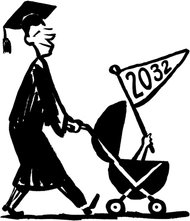
“Do you help with the passion project?” Every so often, I’ll hop on a sales call with an inbound client at my college consulting company, Invictus Prep. Nervous parents, many of them immigrants and newcomers to the American college admissions process, will come prepared with a score of questions about how we propose to help […]
Read More
Editor’s Note: This article presents two essays on Boston University’s decision to “pause” admissions to its doctoral programs. The first is by Cassandra Nelson, a visiting fellow in literature at the Lumen Center in Madison, Wisconsin, and an associate fellow at the University of Virginia’s Institute for Advanced Studies in Culture. Her book A Theology […]
Read More
Much has been made of recent decisions to re-require ACT or SAT scores in student applications to several elite Northeastern colleges. Start of a trend? Will more colleges now follow suit? Covid-19 accelerated an already-existing trend toward adoption of “test optional” admissions, whereby college aspirants could choose whether to include their ACT or SAT scores […]
Read More
You shouldn’t judge a book by its cover, or its title, but how about from an extended interview with the authors? On November 2, Inside Higher Ed carried such an interview with the three authors of a new book entitled Occupying the Academy. The authors, Christine Clark (a professor of multicultural education at UNLV), Kenneth […]
Read More
Cross-posted from Can These Bones Live UCLA law professor Richard Sander has been the target of student protests at his university this week. Sander, a critic of affirmative action, published a report that argued UCLA’s supposedly “holistic” admissions process was quietly including race as a prominent factor in deciding who would be admitted to the […]
Read More
Universities today have lowered their standards of admission and accepted more students regardless of their level of preparation. For example, at the University of South Carolina, where I am presently employed, the number of undergraduates has gone up from about 18,000 in 2006 to 22,000 in 2011. As a result of the increased number of […]
Read More
“Mend it, don’t end it” was the famous advice on affirmative action from Bill Clinton, who did neither. There are, of course, other useful slogans, such as “Muddle it,” which the Supreme Court essentially did in the 2003 Gratz and Grutter cases. The Court held that the University of Michigan could not give a fixed […]
Read More
The Supreme Court holds oral arguments tomorrow in Fisher v. Texas, possibly the most consequential case in years involving affirmative action. Many of us critics of racial preferences are optimistic that Justice Anthony Kennedy, the likely swing vote, will agree to modify if not overrule Justice O’Connor’s ruling in the 2003 Grutter case, which, in […]
Read More
Perhaps anticipating a defeat for affirmative action in the Fisher v. University of Texas case about to be argued before the Supreme Court, Columbia University political philosophy professor and former Dean of the College Michele Moody-Adams has just suggested moving away from a fixation on affirmative action and “Toward Real Equality in Higher Education.” Whatever […]
Read More
Shirley Tilghman, who has just announced that she will step down as president of Princeton at the end of the academic year, was chosen as the successor to former president Harold Shapiro in part because the powers that be thought it about time that the university had a female in that office. She was the […]
Read More
Using federal statistics, Laura Norén has prepared a series of graphics showing gender distribution among recent recipients of undergraduate, M.A., and Ph.D./professional degrees. The charts are visually striking, especially since all three sets of charts show movement in an identical direction. According to Norén, by 2020, women are projected to earn 61 percent of all […]
Read More
The vast majority of American colleges and universities make admission decisions without considering the financial need of applicants. Only a handful of private institutions admit their entire first-year class need-blind and then fully meet the financial need of all of their admitted students through a combination of grants, loans and employment opportunities. These institutions tend […]
Read More
Why is it admirable to “target” women and minorities for some educational programs but a violation of federal civil right laws to “target” them in others? That’s the question that must be asked about a federal lawsuit filed by seven Mississippi women, five of them African-American, against for-profit Virginia College, […]
Read More
Those of us who were disappointed when a divided Supreme Court upheld the distribution of burdens and benefits based on race in Grutter are hopeful that decision might be overturned — or that at least its most deleterious effects might be reined in — when the Court revisits affirmative action next fall in Fisher v. […]
Read More
From what has been revealed so far, it appears that Elizabeth Warren, Harvard law professor and likely Democratic candidate against Sen. Scott Brown in Massachusetts, gave herself status as a Native American in the past, which led Harvard and a leading legal directory to identify her as such, but recently she has claimed that she […]
Read More
Cross-posted from Open Market. Diversity training doesn’t work, according to an article in Psychology Today. In it, Peter Bregman notes, “Diversity training doesn’t extinguish prejudice. It promotes it.” But don’t expect it to stop. Government regulations often require that a school be accredited, a condition that accreditors like the American Bar Association use to force […]
Read More
Inside Higher Ed reports this morning (April 9) about a new study of “holistic” admissions at selective institutions by Rachel Rubin, a doctoral student at the Harvard School of Education, that will be presented at the annual meeting of the American Educational Research Association later this week. Her study confirms, albeit reluctantly, what you already […]
Read More
On February 2 Daniel Golden, former Wall Street Journal reporter and author of a highly regarded book on college admissions, reported in Bloomberg’s Business Week that Harvard and Princeton are being investigated by the Dept. of Education’s Office for Civil Rights for discrimination against Asians. It’s not the first time. In fact, for the past […]
Read More
Claremont McKenna College, a private liberal arts school nestled in the foothills on the eastern outskirts of Los Angeles County, dishonored itself and defrauded the public in a cheap effort to bolster its national rankings in U.S. News and World Report. But if that weren’t bad enough, Claremont’s deception calls into question the very worth […]
Read More
The campus diversity warriors are once again pounding at the gates. This time the pounding comes from on high–the American Political Science Association (APSA) itself. It is a serious clamor: a 76 page report called Political Science in the 21st Century authored by fourteen professors, many from elite research-oriented schools such as Berkeley and UCLA. […]
Read More
Cross-posted from National Association of Scholars. Cross-posted from National Association of Scholars. Fall 2011 has seen some major milestones for the SAT/ACT optional movement. DePaul University, for instance, initiated its first admission cycle sans test requirement. Clark University announced last month that it will offer test-optional admissions for the incoming class of 2013. In his […]
Read More
In a recent essay in Minding the Campus, blogger John S. Rosenberg argued that I was too tough on legacy preferences and not tough enough on affirmative action in college admissions. In my support for class-based affirmative action, he says, I’m not sufficiently outraged about racial preferences. And in arguing that legacy preferences are illegal […]
Read More
Richard Kahlenberg of the Century Foundation is well known for his relentless, articulate, well-researched arguments that affirmative action should be based on class, not race. My reaction to these arguments is usually rather tepid. I find Kahlenberg’s arguments compelling only insofar as he also criticizes race-based preferences, and his criticism of them usually doesn’t go very […]
Read More
A recent survey of college admissions officers, sponsored by insidehighered.com, has attracted some attention in the press, such as this story in the New York Times and, of course, this account at Insidehighered.com (there is a link to a pdf of the full survey report). It’s a valuable document that reveals attitudes and policies among admissions officers […]
Read More
There’s good news out of the U.S. Court of Appeals for the Sixth Circuit: On Friday, the full court agreed to rehear a now infamous decision in which a three-judge panel had earlier struck down the state of Michigan’s Proposal 2. Proposal 2, in turn, is a ban on government discrimination and preference on the basis of […]
Read More
May 28, 2020, was a good day for the American economy and a momentous one for traditional colleges and universities. President Jodie Foster, the sixth Yale graduate to reach the White House, announced that the congressional agreement on Medicare and Social Security had finally begun to reduce the country’s debt, and the disastrous bout of […]
Read More
The American Scholar is the official journal of the Phi Beta Kappa Society — the college honorary society– and like The New York Times and The New York Review of Books, its focus is highbrow and its writing quality generally of a high order. Also like the Times and the NYRB, when dealing with current political […]
Read More
There is a remarkable moment in Andrew Ferguson’s Crazy U: One Dad’s Crash Course on Getting His Kid into College, which just came out this week. (The New York Times has an excerpt from the book here). Ferguson and his son are in the middle of the application process, both of them dismayed and discomfited […]
Read More
Legacy preferences have come under increased scrutiny of late, as well they should. Most elite colleges and universities, including all the Ivies, grant legacy preferences, just as they all grant special consideration — and lowered admission standards — for recruited athletes, blacks, Latinos, and Native Americans. They also give huge boosts to the sons and […]
Read More
The U.S. Court of Appeals for the Fifth Circuit not only upheld racial preferences in college admissions decisions on Jan. 18 but upheld them with a vengeance. The Fifth Circuit’s three-judge panel unanimously agreed, in Fisher vs. University of Texas at Austin, that UT’s flagship campus in Austin could consider an applicant’s race and ethnicity […]
Read More